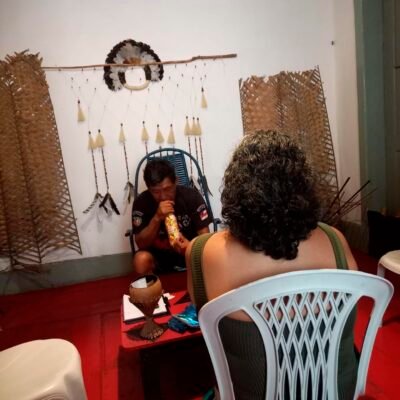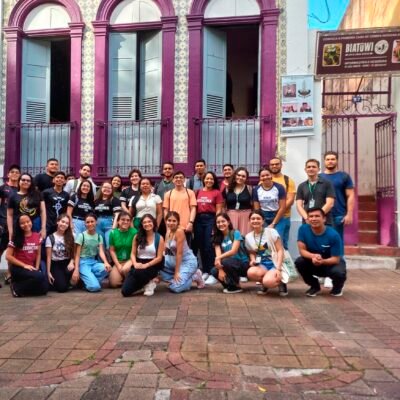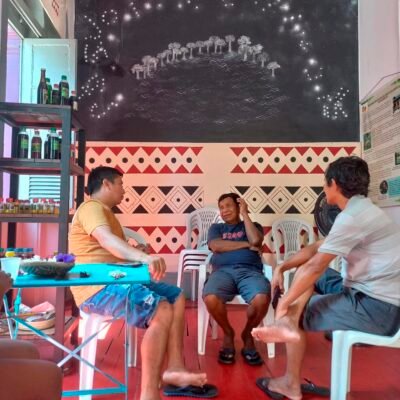
BAHSERIKOWI CENTER OF INDIGENOUS MEDICINE
LIVING SCHOOL TUKANO-DESSANO-TUYUKA
Location: Rua Bernardo Ramos, n° 97, Centro Histórico, Manaus- AM
People benefited: 1,000 people served annually
Coordinators: João Paulo Tukano and Carla Wisu
The Bahserikowi Indigenous Medicine Center is located in the center of the city of Manaus, the capital of the state of Amazonas. Its foundation in this city was a strategic choice to impact universities and public institutions and promote a change in public opinion about Indigenous medicine. Currently working at Bahserikowi are Carla Wisu, João Paulo Tukano, kumu Doe, Ivan Tukano, Pedro Tukano, Durvalino Kisibi, Janine Fontes and kumu Álvaro Maia Castilho.
The kumuã specialists who work at the Bahserikowi Indigenous Medicine Center come from the Yepamahsã (Tukano), Utãpirõ-porã (Tuyuka) and Umukori-mahsã (Desana) Indigenous communities of the Upper Tiquié River, a tributary of the Uaupés River, Upper Rio Negro.
The service is open to the general public, both Indigenous and non-Indigenous. The kumu is available to assist people and care for them with bahsese and medicinal plants.
The health care and healing technologies used at the Bahserikowi Indigenous Medicine Center are basically bahsese (better known as blessings) and medicinal plants.
Bahsese are metachemical and metaphysical formulas evoked by specialists for protection, treatment and healing. In other words, bahsese is the power and ability of specialists (kumuã) to evoke the healing substances of plants, minerals and animals.
Indigenous peoples have always used medicinal plants. The forest holds all kinds of remedies. In the house, there are also natural remedies for sale. There are teas, ointments, honey, copaiba, andiroba, white pitch for smoking, bark, roots, leaves and dried medicinal flowers.
The Bahserikowi Indigenous Medicine Centre works with various institutions, such as the Pan-American Health Organization, the Secretariat for Indigenous Health (SESAI) and the Oswaldo Cruz Foundation (Fiocruz), hosting working groups and jointly drawing up Indigenous health programs. In addition, the center frequently hosts academic classes from the Federal University of Amazonas, mainly in the area of health, establishing a dialogue with the institution's researchers.
“I couldn't think of a better word than ‘bahsese’ to define my Üremiri-sararo-yupuri-buberãporã group. Bahsese, better known as blessing, is my group's specialty. It is the indispensable, most important knowledge for human life. In other words, it is a technology of health care and healing, as well as being a technology of person-building, communication and cosmopolitical relations. So I come from a family of specialists like Yaiwa and Kumuã. And we are currently the founders of the first Bahserikowi Indigenous Medicine Center in Amazonas. We are also a reference center for other Indigenous peoples, so that they can look up to us and create their own spaces for health care and healing.”
João Paulo Lima Barreto
MONTHLY SUPPORT:
Covers the costs of maintaining the Medical Center, guarantees the resources for the Kumuã to live in Manaus and contributes to travel between the village in the Rio Negro basin and the city of Manaus.
NEXT STEPS:
Articulate partnerships and exchanges.
To help set up a House of Essence.
To help Bahserikowi's activities return to the villages.

COORDINATORS
Carla Wisu is a member of the Dessano Indigenous people, born in the community of Cucura Manaus, in the Indigenous Territory of the Upper Rio Negro. She is the administrator of the Bahserikowi Indigenous Medicine Center, our Tukano-Desana-Tuyuka Living School, and a master's student in Social Anthropology at the Federal University of Amazonas (PPGAS/UFAM).
João Paulo Tukano is an Indigenous anthropologist from the Yepamahsã (Tukano) people, born in the São Domingos village, in the Alto Rio Negro Indigenous Land, in São Gabriel da Cachoeira (AM). He was the first Indigenous person to defend his doctorate in Anthropology at the Federal University of Amazonas and is currently a professor at UFAM. He has worked in primary and higher education, as well as in Indigenous organizations in Amazonas, and is a researcher at the Nucleus of Indigenous Amazonian Studies (NEAI). He was the creator and co-founder of the Center for Indigenous Medicine of the Amazon, a clinic created in 2017 specifically to serve the people.







